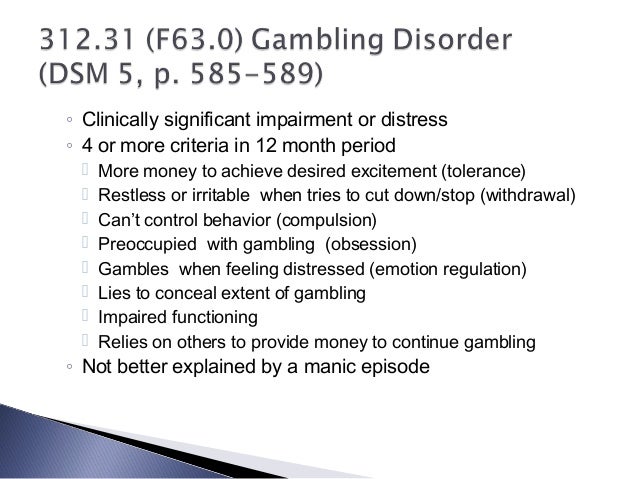Distress Tolerance Gambling
- Distress Tolerance Gambling Meaning
- Distress Tolerance Gambling Addiction
- Distress Tolerance Gambling Rules
A comprehensive 12-month evidence-based program providing clarity, precision and compassion with skills group sessions teaching:
Distress tolerance skills training is a core feature of dialectical behavior therapy for borderline personality disorder (BPD).The distress tolerance skills are meant to reduce impulsive behavior which can often result from an inability to tolerate strong emotions. The DBT distress tolerance acronym ACCEPTS is a group of skills to help you tolerate a negative emotion until you are able to address and eventually resolve the situation. In an early season of the 90’s sitcom Friends, Monica is dating Pete Becker. Distress tolerance skills help a person deal with overwhelming emotions or pain. A person who experiences overwhelming emotions on a regular basis must have strong distress tolerance skills in order to avoid letting the emotions control the person. Daughters SB, Lejuez CW, Strong DR, Brown RA, Breen RB, Lesieur HR. The relationship among negative affect, distress tolerance, and length of gambling abstinence attempt. 2005; 21:363–378. Subsumed under the broader category of distress/tolerance, which represents an. Given the high rates of co-morbidity and distress associated with problem gambling, it.
Distress Tolerance
Distress Tolerance Gambling Meaning
Cope with distressing thoughts, emotions, impulses or urges to self-harm
Emotional Regulation
Skills to identify emotions and prevent them from becoming overwhelming
Interpersonal Effectiveness
Improve relationships and balance your own needs/wants with others
Mindfulness
Skills to increase awareness and reduce suffering
The DBTBrisbane Intensive Therapy Program is suitable for clients with:
Intense and fluctuating emotions.
Deliberate self-harm
Suicide attempts or suicidal thoughts.
Gambling
Substance abuse
Unsafe sexual practices
Drink driving
Speeding
Over-spending
Shop-lifting
Binge eating
Poor interpersonal skills including aggression
What's Involved?
Initially you will be allocated an Individual Therapist. Your Individual Therapist will provide information about the DBTBrisbane program and answer questions about its suitability for you.
DBTBrisbane Intensive Therapy
The program involves attending Individual Therapy and Skills Group and utilising phone support. This will provide you with over 3 ½ hours of Therapy per week.
Distress Tolerance Gambling Addiction
Individual Therapy
Commitment of 1 hour per week
You will be allocated an Individual Therapist for the duration of the DBT Program.
DBT Individual Therapy focuses on enabling you to overcome the specific difficulties that you identified as the reason that you wanted to attend DBT.
Distress Tolerance Gambling Rules
You will receive further information about how this works when you meet with us.
Individual Therapy is held at a time arranged between you and your therapist, at a Brisbane location convenient to you.
Skills Group
Commitment of 2.5 hours per week
In Skills Group you will be provided with information and practical exercises to enable you to learn new skills for managing emotions, distress, conflict and coping with life.

Skills Group is taught by Two Trained Therapists and limited to a maximum of 10 clients.

NIght Skills Group for adults is held weekly on Thursday evenings in Toowong.
Limited to a maximum of 10 clients.
Phone Coaching
Phone support (Phone Coaching) is provided to enable you to practicing skills in a crisis or difficult situation. Phone Coaching is different to some other styles of therapy in that it is not phone counselling or a crisis driven service but rather it is coaching in skill usage.
Phone Coaching is available during office hours, after hours and on weekends.
Consult Group

DBTBrisbane Therapists meet together on a weekly basis to ensure that each clinician is offering their clients the highest quality of adherent DBT treatment. The focus is on clinician skill rather than the specific details of the clients.
'In order to do DBT to fidelity, you must be on a DBT consultation team. Providers without a DBT team may choose to integrate DBT skills and strategies, but they should not present themselves as full DBT therapists.'
An additional benefit is that each Consult Group member does obtain a reasonable idea of the issues for each of the clients. This means that when an individual therapist is away, (holidays, sickness, etc.) we can cover for each other without the client having to start from scratch. Whilst each client will have a particularly strong relationship with their individual therapists, we are a community of therapists treating a community of clients.
Referrals
You would only need a referral from a GP if you wish to claim rebates under a mental health care plan. Referrals can be to DBTBrisbane for Focused Psychological Therapies under the Better Access Scheme.
See our FAQs to find more answers to common questions.